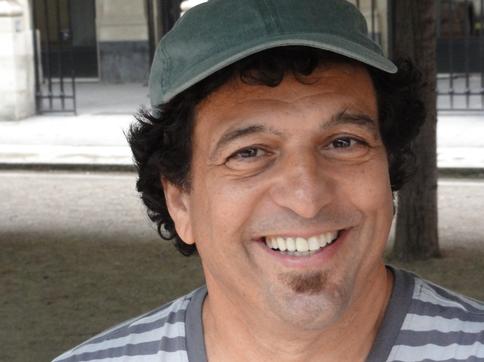In My Own Words: Sam Guttman finds his life with keratoconus comical

What is Surfer’s Eye?
May 10, 2022
Congratulations to OCULUS for 20 years on Keratoconus Diagnostic Technology!
July 6, 2022Meet Sam Guttman of Santa Rosa, California. If you were to imagine a Renaissance man, you might picture someone like Sam. His interests and talents are wide-ranging: he estimates he could build a house from the ground up using his carpentry and construction skills. He is also a world traveler, accomplished composer, guitar teacher, mixed media artist, performer and comedian. His take on life with KC should bring a smile to those with KC:
“It started at eight years old, when I realized at summer camp that I could not shoot a bow and arrow because I could not see the target, let alone the haystack when I closed one eye and took aim.
So started many years of ophthalmologists rolling my eyelids inside out just to take a peek underneath. I think this was mostly just to marvel at my pointy corneas. Hard contacts at nine years old. Putting a contact lens on a keratoconus eye is like trying to balance a Frisbee on a stick: it’s going to fall off.
Jump forward to 1981. I was 27 years old and my eye had become so pointy that I took a chance with a cornea transplant. I was miserable for six months after the surgery, but what other choice did I have? Happily, the disease stopped progressing.
Since then, the transplant stayed healthy, but the edge of my own cornea continued to thin. Who knew? In 2021, I opted for lamellar surgery. “What’s that?” you ask. Today, doctors can sew a patch or choose to use only a layer of the donated cornea to blend it together like plywood. The bottom line is that I’ve had 40+ years with the same transplanted cornea and wear scleral lenses that improve vision in my eye to 20/25. With these lenses, I can see what aisle I am in at the supermarket by reading the sign overhead. Or order a burger without guessing. Trust me, that’s a big deal.
Scleral lenses float over the cornea, so no pain. These lenses are sparing many people from transplant surgery and – I’ve been told by my doctor – they are a Godsend for many with KC.
Insurance companies often won’t cover the cost of scleral lenses for keratoconus which are a medical necessity like a prosthetic limb or a knee brace, which they will pay for. The only way we will get insurance companies, especially Medicare, to change their archaic policies is if enough of us write to Congress and to our insurance companies. These lenses cost a fraction of eye surgery and actually save money, but insurance companies are stuck in the stone age. Help me to help us all make scleral lenses possible for everyone.”
Love. Laugh. Learn. Learn more at SamGuttman.com



